The Benefits of Regular Lawn Maintenance
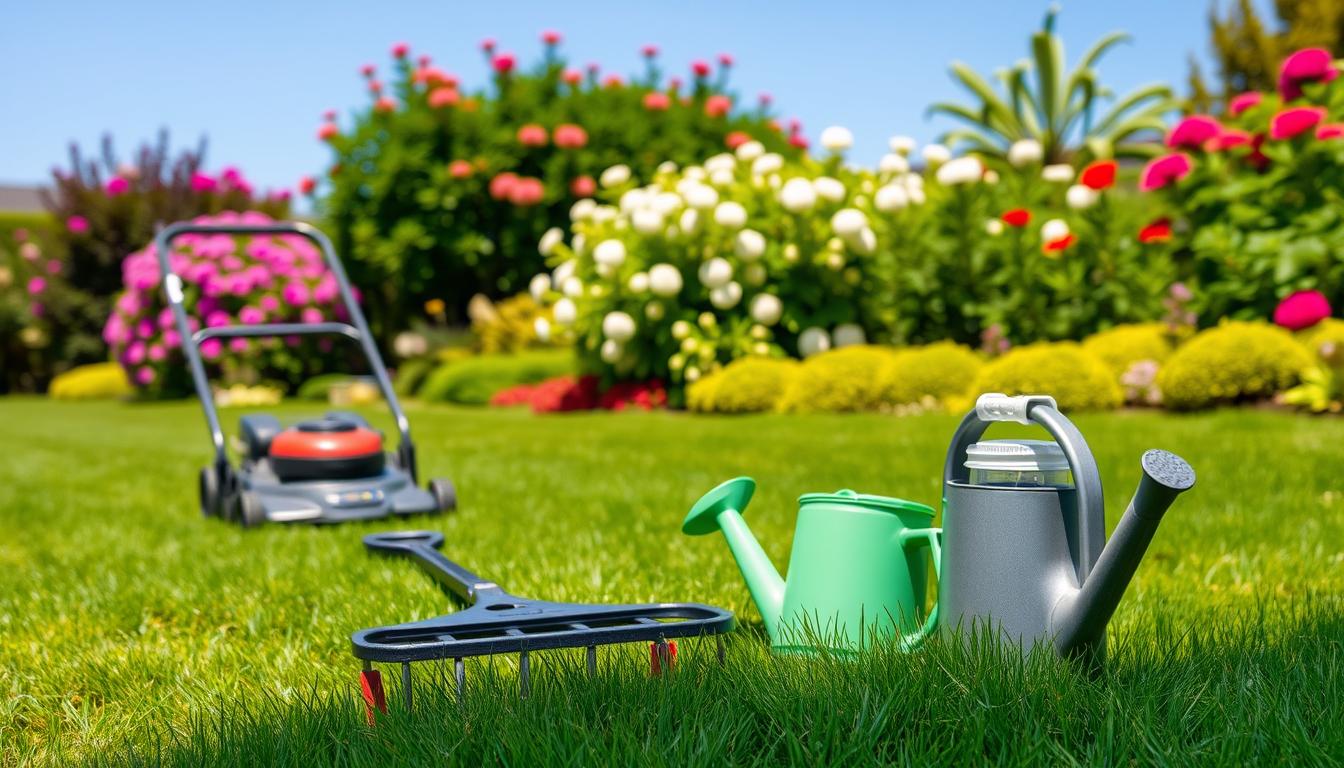
Did you know that 98% of realtors think curb appeal is key in home buying? Your lawn’s look makes a big impression on neighbors and buyers. Regular lawn care does more than just look good – it boosts your outdoor space’s health and value.
Regular mowing lets grass get the right sunlight for photosynthesis, making it healthier and greener. Grass clippings after mowing also add nutrients, recycling up to 25% of nitrogen back into the soil. Good lawn care also helps control pests, as tall grass attracts ticks, fleas, and other pests. Mowing weekly keeps grass from getting too tall, keeping pests away.
Keeping grass at the right height also protects the soil from too much sun, which can lead to weeds. A well-mowed lawn makes your property look better, impressing everyone. Regular care gives your grass the nutrients it needs to stay healthy and vibrant, preventing problems like brown patch disease.
Healthy lawns also help the environment by filtering air, water, and reducing greenhouse gases. Regular mowing makes upkeep simpler, saving you time and effort. A well-kept lawn is a safe place for kids and pets to play, and it helps prevent soil erosion, protecting your property.
Key Takeaways
- Regular lawn maintenance promotes healthier, greener grass through photosynthesis and nutrient recycling.
- Proper mowing and weed control help prevent pest infestations and lawn diseases.
- A well-manicured lawn enhances curb appeal and increases property value.
- Healthy lawns provide environmental benefits by filtering air, water, and reducing greenhouse gases.
- Consistent lawn care saves time and effort in the long run, creating a safe, inviting outdoor space.
Healthier Grass Through Photosynthesis
Many homeowners want a lush, vibrant lawn. One key is consistent mowing, which boosts healthier grass and photosynthesis. This exposes grass blades to sunlight, making them greener and stronger.
Leaving grass clippings on the lawn also helps. These clippings act as natural fertilizer, adding up to 25% of nitrogen back into the soil. This keeps your lawn lush and vibrant all year.
Photosynthesis and Grass Growth
It’s important to know how photosynthesis works for different grass types. Cool-season grasses grow fast in spring but slow down in summer. They fix less carbon dioxide, affecting growth.
Warm-season grasses, like bermudagrass and Zoysiagrass, grow better in heat. They have deeper roots. Tailoring mowing and fertilization to your grass type boosts photosynthesis and lawn health.
“A healthy lawn of 25 square feet during the active growing season provides enough oxygen for one adult person for one day.”
Regular mowing and leaving clippings create the best conditions for your lawn. This leads to a lush, healthier grass. Your lawn will look great and help the environment.
Effective Pest Control
Keeping your lawn well-manicured is more than just about looks. It’s key to keeping pests away. Regular weekly mowing stops grass from getting too long. Tall grass attracts ticks, fleas, and other pests. By mowing regularly, you keep your yard pest-free.
Disrupting the Pest Lifecycle
Regular weekly mowing hinders pests like grubs, chinch bugs, and sod webworms. This stops them from damaging your grass. It makes your lawn less appealing to pests.
Integrated Pest Management
For a full pest control plan, try integrated pest management. It uses different methods to control pests without too much chemical use. Mowing, fertilizing, and watering right are key. Natural helpers like ladybugs and nematodes also play a part.
If chemicals are needed, use them wisely. Choose safe options like neem oil and diatomaceous earth. Working with a lawn care pro can help keep your lawn healthy and pest-free.
Weed Management
Keeping your lawn at the right height is key to weed control. The right grass length shields your soil from too much sun. This is a common cause of weed growth.
When grass is too long, weed seeds can sprout and take over. This harms your lawn’s health and looks.
Strategic mowing stops weeds before they start. Cutting your grass at the right height stops weeds and makes your grass stronger. This saves you time and effort in the long run.
Regular mowing is also vital. It stops weeds from flowering and seeding. This, along with selective herbicides or organic methods, keeps your lawn weed-free.
| Weed Management Strategies | Benefits |
|---|---|
| Maintaining optimal grass height | Prevents weed germination and spread by protecting soil from excessive sun exposure |
| Consistent mowing | Disrupts weed flowering and seeding, limiting their ability to multiply |
| Selective herbicide use | Targets specific weed species, eliminating them without harming desirable grasses |
| Organic weed control | Promotes a healthier ecosystem by maintaining soil quality without the use of harsh chemicals |
Using these strategies and keeping the right grass height ensures a weed-free lawn. This makes your lawn look great and keeps it healthy for years.
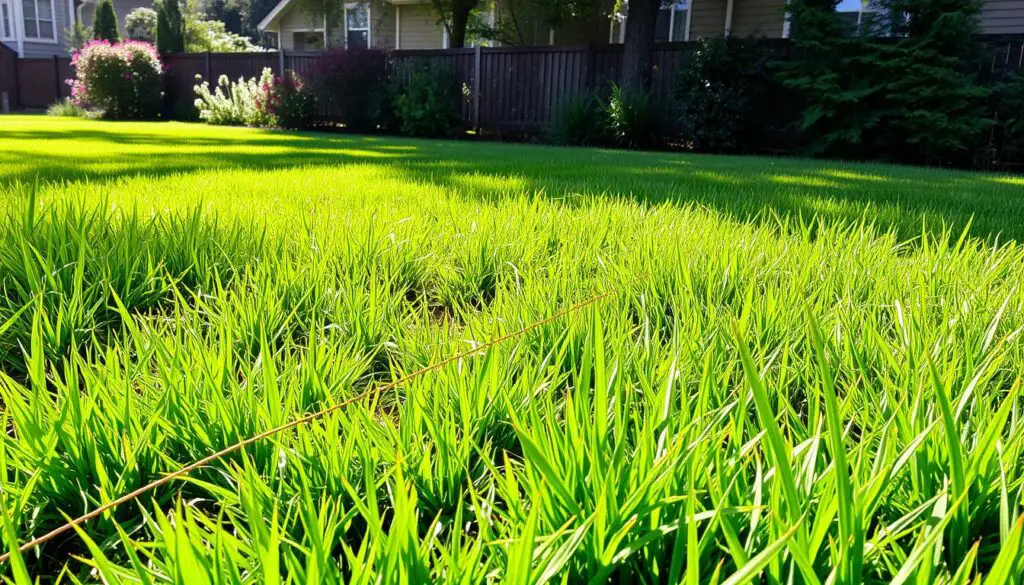
“Weed-free environments allow for strong root development among plants, leading to stronger and more resilient vegetation.”
Improved Curb Appeal
Keeping your lawn well-manicured can really boost your home’s curb appeal. It impresses neighbors and potential buyers. A fresh, green lawn makes your outdoor space look inviting and well-kept.
This can increase your property’s value and leave a good impression. Studies show landscaping can raise property values by up to 20%. Homes with good landscaping sell for 5.5% to 12.7% more than those without.
Regular lawn care prevents pests, diseases, and weeds. It keeps your lawn looking great. Proper care like irrigation, fertilization, and aeration can pay off big time.
Granular fertilizers are more costly but offer steady benefits. Aerating helps roots grow strong. Eco-friendly lawn care also boosts appeal and saves money in the long run.
To really stand out, add ornamental trees, floral borders, and seasonal colors. Defined edges, landscape lighting, and a fresh front door make a big difference. Focus on your lawn’s health and look to increase your property’s value and make a great first impression.
“Landscape economists suggest that good landscaping can add up to 28% to a home’s overall value.”
lawn maintenance benefits
Keeping your lawn healthy and vibrant is key for your property’s look and value. Practices like mowing, fertilizing, and pest control offer many benefits. Professional lawn care makes your outdoor space lush and functional, enhancing your home’s beauty and use.
Nourishing Your Lawn
Good lawn care gives your grass the nutrients it needs to grow strong. Lawn care pros use safe products that help your grass stay healthy. This makes your lawn green and thick, boosting your property’s value by up to 14%.
Promoting Grass Health
Regular mowing, aeration, and overseeding keep your lawn healthy. These steps ensure your grass gets enough sunlight and prevents thatch buildup. With professional care, your lawn becomes safer and more welcoming for family and pets.
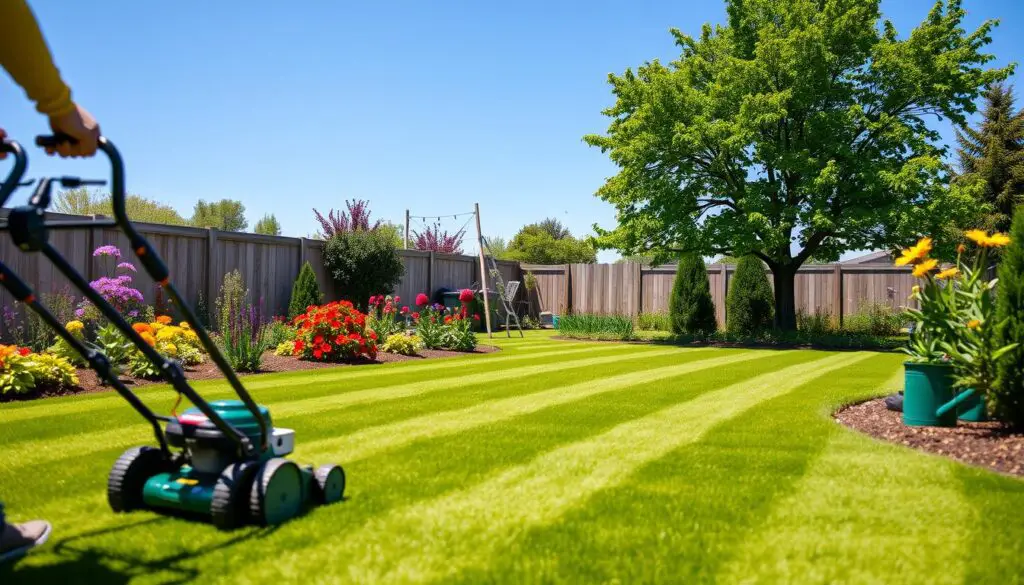
Saving Time and Effort
Lawn care can take a lot of time and effort, more so for big yards. Hiring pros saves you time and energy. They have the skills and tools to keep your lawn looking great without the hassle.
Investing in lawn care is smart. It boosts your home’s curb appeal, value, and outdoor space. Working with a trusted lawn care company lets you have a beautiful lawn with little effort from you.
Keep Your Mower Healthy
|
Chevron Techron Concentrate Plus Fuel System Cleaner 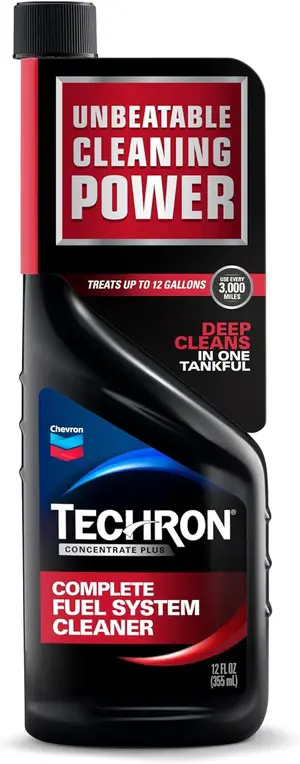
Shop Now
|
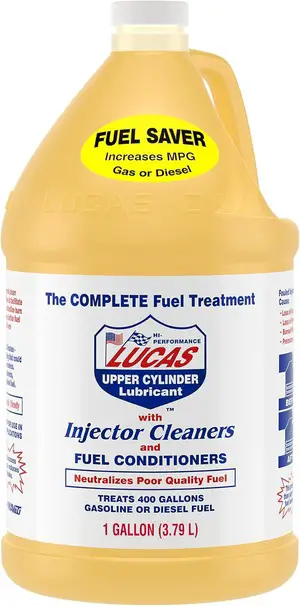
Shop Now
|
Engine Oil Additive, Engine Treatment, Wear & Tear Protection for Gasoline & Diesel 
Shop Now
|
Preventing Lawn Diseases
Keeping your lawn healthy and lush is a big job. One common problem is brown patch disease, a fungal infection that can spread fast. Regular lawn care can help catch and fix these issues before they get worse.
Brown patch is a big problem in the Carolinas, affecting many types of grass. Other diseases like large patch and dollar spot can also harm your lawn. Dollar spot creates small, damaged patches, while rust causes yellow and orange flakes to appear.
Understanding what makes these diseases grow is key. Warm temperatures, high humidity, and poor drainage are perfect for fungi. Compacted soil and wrong watering habits can also make your lawn more vulnerable.
By keeping up with lawn care, you can prevent many problems. Proper fertilizing, watering in the morning, and using sharp mower blades are important. A good fungicide program, like RDS Lawn Care Services, can also protect your lawn.
Prevention is the best way to keep your lawn healthy. With regular care and quick action on problems, your lawn will stay beautiful all year.
Environmental Benefits
Keeping your lawn green is good for the planet. It acts as a natural filter, cleaning the air and water. It also helps cut down on greenhouse gas emissions. By taking care of your lawn, you help make the environment healthier.
Here are some key benefits of a well-kept lawn:
- Lawns act as environmental noise insulation, reducing noise pollution in neighborhoods with a lot of vegetation.
- Areas with extensive lawn space and vegetation purify the air by trapping CO2 and releasing rich Oxygen.
- Lawns reduce incidents of water runoff by providing flood control, preventing erosion and leaching.
- Grass yards cool the environment by absorbing heat energy, resulting in cooler temperatures compared to areas with less vegetation.
- Lawns break down organic materials, improving soil quality and enhancing soil structure over time.
Lawns also help by trapping carbon dioxide. This improves air quality by reducing CO2 levels. Grass helps regulate air temperatures and quality.
Lawns are crucial in reducing stormwater runoff. Without enough grass, heavy rain can cause erosion, leading to flooding and water pollution. Grass helps water soak into the ground, keeping water resources sustainable.
Lawns also reduce noise pollution. They absorb sound waves, making urban and suburban areas quieter. Plus, they help keep areas cooler, which can save energy by reducing the need for air conditioning.

“Healthy, green lawns filter air, water, and reduce greenhouse gases, making them good for the environment.”
Cost Savings
Keeping up with a regular mowing schedule can save you a lot of money over time. Regular lawn mowing makes upkeep easier and less time-consuming. This way, you avoid the extra costs and effort of fixing an overgrown lawn.
By mowing your lawn regularly, you can keep your outdoor space looking great. This not only saves you money but also saves time and effort.
In fact, studies show that a beautiful lawn can increase your property’s value by up to 17% Hiring a lawn care service can save you time, but DIY lawn care can save you money. Yet, it’s crucial to consider the pros and cons, like the cost of hiring a service.
| DIY Lawn Care Costs | Professional Lawn Care Costs |
|---|---|
|
|
DIY lawn care lets you make your own choices, but hiring a pro offers convenience and expertise. Your decision should depend on your needs, budget, and how much time and effort you want to save.
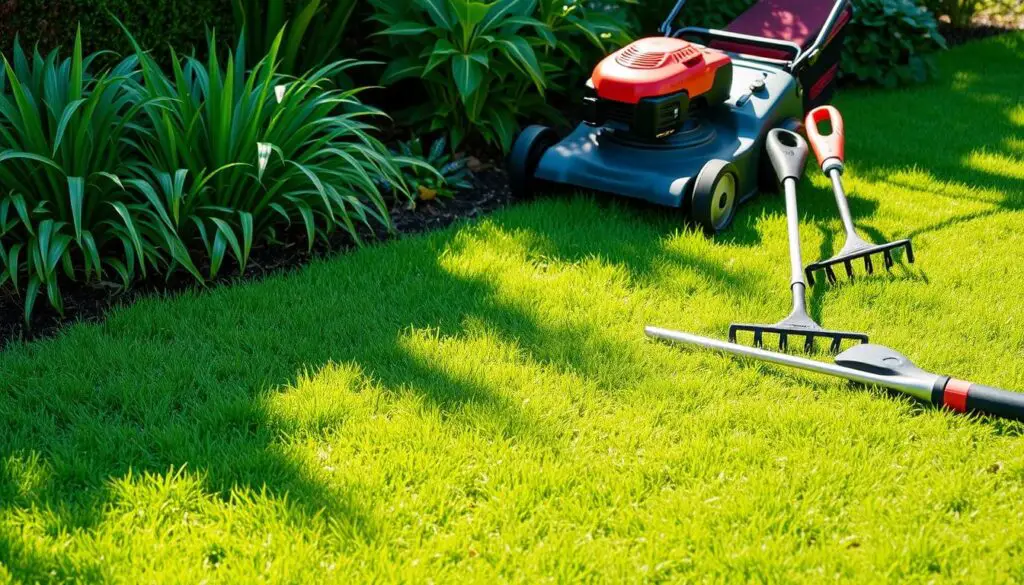
“Preventative grub control by professionals saves homeowners from brown, dead patches of grass, and hiring professionals for aeration and overseeding ensures more efficient results compared to DIY methods.” – Sam Masser, author of the blog
Safety for Family and Pets
A healthy lawn is a safe place for kids and pets to play. Keeping your grass short and pest-free makes your outdoor space safe. This lets your family and pets enjoy a green lawn without worry.
Protecting Pets from Lawn Hazards
Keeping your lawn safe for pets is key. Chemicals in lawn care products can harm them. Sharp objects and toxic plants are also dangers.
Pests like fleas and ticks can also be a problem. To keep pets safe, use organic lawn care. Keep them away from treated areas and check the lawn for hazards often.
- Choose pet-safe plants and landscaping
- Provide shade and clean water to prevent overheating
- Train pets to stay away from dangerous spots
- Add pet-friendly features like a sandbox or agility equipment
By focusing on safety, you can make a safe, family-friendly lawn. This way, everyone, including pets, can enjoy the outdoors worry-free.
Reduced Erosion
Keeping your lawn healthy is more than just making it look good. It also helps protect your property. Grass acts as a natural barrier, stopping soil erosion and keeping your investment safe. Regular lawn care is key to these benefits.
Mowing your grass at 3 to 3.5 inches tall helps it grow deeper roots. These roots make your lawn thicker and stronger. Taller grass also lets more water soak into the ground, helping to refill groundwater.
Short grass, on the other hand, leads to more runoff. This can wash away valuable topsoil. Heavy rains and strong winds can carry away soil, bringing pollutants like fertilizers and pesticides into waterways.
Keeping your lawn healthy and tall helps the environment. Stronger grass roots prevent waterways from silting up and protect aquatic habitats. Leaving grass clippings on the lawn also acts as natural mulch, reducing the need for extra fertilizers and preventing nutrient runoff.
To make sure your lawn protects your property, use POLYON fertilizer. It gives controlled-release nutrients for deep root growth and less water pollution. Also, use water conservation practices like deep and infrequent watering to promote strong roots and save water.
Regular lawn maintenance is a smart choice for protecting your property and the environment. By using grass as a natural barrier, you can have a beautiful lawn. You’ll also protect your investment and help create a healthier, more sustainable future.
| Grass Height | Soil Erosion Impact |
|---|---|
| Taller Grass (3-3.5 inches) | Deeper roots act as natural barrier, reducing soil erosion |
| Shorter Grass (less than 3 inches) | Shallow roots increase runoff and soil erosion |
“A well-maintained lawn with thick grass roots can prevent soil erosion during heavy rains.”
Increased Property Value
Regular lawn maintenance can boost your property’s value. A lush, green lawn with a neat look improves your home’s curb appeal. This makes your home more appealing to buyers, leading to a higher appraised value.
Real estate experts say a well-kept lawn can add 15 to 20% to your property’s value. A well-cut lawn stands out and can make your home more attractive. It can also make buyers think the inside of the home is well-kept, which might save them money on repairs.
Landscaping and home value are closely linked. As home values go up, so does the expectation for landscaping quality. While it may not greatly increase your home’s value, great landscaping can make it more appealing to buyers. In some cases, a home with better landscaping might be chosen over a more expensive one with poor landscaping.

